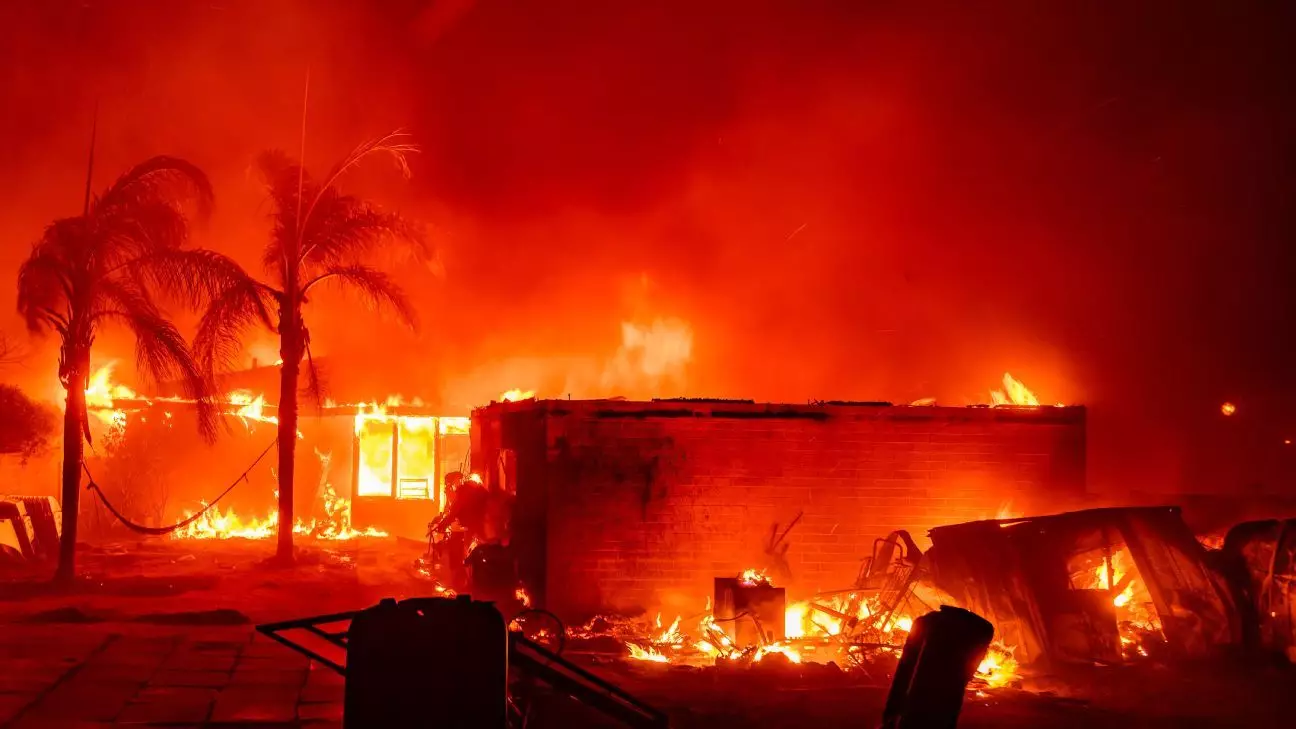In recent years, California’s wildfire season has transformed from a seasonal concern into a year-round crisis, impacting local communities, air quality, and even major sporting events. The recent wildfires sweeping through Los Angeles have forced thousands to evacuate from their homes and generated an immediate response from the NFL concerning an upcoming playoff game. As the Minnesota Vikings and Los Angeles Rams prepared for their showdown at SoFi Stadium, the league had to contemplate the real possibility of relocating the game—high stakes not only for the teams involved but also for the integrity of the community facing unprecedented challenges.
The Role of the NFL: Contingency Planning Amid Crisis
The NFL’s proactive approach highlights its awareness of the severe implications of natural disasters on sports gatherings. The league stated that while preparations were still underway for the game at SoFi Stadium, there was a contingency plan to potentially shift the event to State Farm Stadium in Glendale, Arizona, should the situation continue to deteriorate. This display of readiness is reminiscent of a precedent set in 2003 when a game was relocated due to wildfires. The NFL, usually focused on competition, found itself navigating a dual role of sporting authority and community support amid chaos.
While this decision reflects the NFL’s responsibility to ensure the safety of players, staff, and fans, it also underscores the growing intersection between sports and larger environmental issues. Factors such as air quality levels—peaking as “very unhealthy” in some locations—make clear the need for such contingency measures.
The Los Angeles Rams and Chargers are at the heart of this crisis, though it’s evident that the effects of the wildfires are felt beyond just the immediate operational concerns of a football game. Rams officials stated that none of their players or staff have been directly affected by the fires, yet players remain deeply engaged with the larger crisis, as evidenced by star receiver Cooper Kupp’s heartfelt social media post recognizing the efforts of firefighters and first responders.
Conversely, the Chargers took steps to mitigate exposure to poor air quality by altering their practice schedules. Defensive coordinator Jesse Minter’s remarks about balancing safety and preparation reveal the complex dynamics of managing an athletic team’s operations during such a crisis. Such adjustments emphasize that the impact of wildfires is not solely physical; it extends to mental and emotional aspects as well, as players navigate their responsibilities while worrying about their communities.
Air quality has emerged as a pivotal concern not only for safety during practice but also for long-term athletic performance. With indices reporting figures well above 200, the implications for health—ranging from decreased lung function to longer-term respiratory complications—create a pressing need for organizations to prioritize athlete well-being in planning. Reports detailing Chargers Coach Jim Harbaugh’s decision to separate practice units and limit outdoor sessions demonstrate the severity with which teams are taking the current conditions.
Moreover, individualized experiences, such as those of the Chargers’ wide receivers coach living near affected areas, encapsulate the personal stakes that are heightened in times of crisis. Football, often viewed as an insular world, is inevitably connected to the wider community, blurring the lines between game-day excitement and the day-to-day anxieties faced by the individuals representing these franchises.
Community Engagement: The NFL’s Humanitarian Response
In the midst of such crises, sports organizations have the platform and the responsibility to amplify the causes that affect their communities. The Chargers’ commitment to donate $200,000 to local aid organizations showcases an understanding that their influence extends far beyond the field. Their support for groups like the American Red Cross and pet rescue organizations symbolizes a broader acknowledgment of community struggles and the role sports can play in providing relief.
As wildfires continue to devastate California, causing loss and hardship, such initiatives not only provide significant financial alleviation but also serve as a rallying point, bringing communities together during their darkest hours.
The intersection of climate change and sports is increasingly unavoidable, as prolonged wildfire seasons and erratic weather patterns challenge traditional notions of seasonality in athletics. If current trends continue—marked by devastating wildfires occurring outside of the usual June-October window—sports leagues will need to continually adapt. The NFL’s response in Los Angeles is perhaps a harbinger, not just of resilience in the face of disaster, but of a larger trend in sports organizations taking on social responsibility and environmental awareness.
Sports, with their immense cultural footprint, are uniquely positioned to lead conversations surrounding climate action and community solidarity. Whether through strategic contingency planning, community support, or health-focused practices, the NFL and its constituents must navigate these complex terrains, shaping the future of sport in an era when the unexpected seems increasingly normative.


Leave a Reply